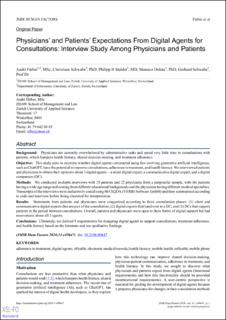Please use this identifier to cite or link to this item:
https://doi.org/10.21256/zhaw-30573Full metadata record
| DC Field | Value | Language |
|---|---|---|
| dc.contributor.author | Färber, Andri | - |
| dc.contributor.author | Schwabe, Christiane | - |
| dc.contributor.author | Stalder, Philipp | - |
| dc.contributor.author | Dolata, Mateusz | - |
| dc.contributor.author | Schwabe, Gerhard | - |
| dc.date.accessioned | 2024-05-02T11:59:30Z | - |
| dc.date.available | 2024-05-02T11:59:30Z | - |
| dc.date.issued | 2024-03-18 | - |
| dc.identifier.issn | 2292-9495 | de_CH |
| dc.identifier.uri | https://digitalcollection.zhaw.ch/handle/11475/30573 | - |
| dc.description.abstract | Background: Physicians are currently overwhelmed by administrative tasks and spend very little time in consultations with patients, which hampers health literacy, shared decision-making, and treatment adherence. Objective: This study aims to examine whether digital agents constructed using fast-evolving generative artificial intelligence, such as ChatGPT, have the potential to improve consultations, adherence to treatment, and health literacy. We interviewed patients and physicians to obtain their opinions about 3 digital agents—a silent digital expert, a communicative digital expert, and a digital companion (DC). Methods: We conducted in-depth interviews with 25 patients and 22 physicians from a purposeful sample, with the patients having a wide age range and coming from different educational backgrounds and the physicians having different medical specialties. Transcripts of the interviews were deductively coded using MAXQDA (VERBI Software GmbH) and then summarized according to code and interview before being clustered for interpretation. Results: Statements from patients and physicians were categorized according to three consultation phases: (1) silent and communicative digital experts that are part of the consultation, (2) digital experts that hand over to a DC, and (3) DCs that support patients in the period between consultations. Overall, patients and physicians were open to these forms of digital support but had reservations about all 3 agents. Conclusions: Ultimately, we derived 9 requirements for designing digital agents to support consultations, treatment adherence, and health literacy based on the literature and our qualitative findings. | de_CH |
| dc.language.iso | en | de_CH |
| dc.publisher | JMIR Publications | de_CH |
| dc.relation.ispartof | JMIR Human Factors | de_CH |
| dc.rights | https://creativecommons.org/licenses/by/4.0/ | de_CH |
| dc.subject | Adherence to treatment | de_CH |
| dc.subject | Mobile phone | de_CH |
| dc.subject | Digital agents | de_CH |
| dc.subject | eHealth | de_CH |
| dc.subject | mHealth | de_CH |
| dc.subject | Electronic medical records | de_CH |
| dc.subject | Health literacy | de_CH |
| dc.subject | Mobile health | de_CH |
| dc.subject.ddc | 302.2: Kommunikation | de_CH |
| dc.subject.ddc | 610: Medizin und Gesundheit | de_CH |
| dc.title | Physicians’ and patients’ expectations from digital agents for consultations : interview study among physicians and patients | de_CH |
| dc.type | Beitrag in wissenschaftlicher Zeitschrift | de_CH |
| dcterms.type | Text | de_CH |
| zhaw.departement | School of Management and Law | de_CH |
| zhaw.organisationalunit | Institut für Wirtschaftsinformatik (IWI) | de_CH |
| dc.identifier.doi | 10.2196/49647 | de_CH |
| dc.identifier.doi | 10.21256/zhaw-30573 | - |
| zhaw.funding.eu | No | de_CH |
| zhaw.issue | e49647 | de_CH |
| zhaw.originated.zhaw | Yes | de_CH |
| zhaw.publication.status | publishedVersion | de_CH |
| zhaw.volume | 11 | de_CH |
| zhaw.publication.review | Peer review (Publikation) | de_CH |
| zhaw.author.additional | No | de_CH |
| zhaw.display.portrait | Yes | de_CH |
| Appears in collections: | Publikationen School of Management and Law | |
Files in This Item:
| File | Description | Size | Format | |
|---|---|---|---|---|
| 2024_Faerber-etal_Physicians-patients-expectations-digital-agents_jmir.pdf | 569.88 kB | Adobe PDF |  View/Open |
Show simple item record
Färber, A., Schwabe, C., Stalder, P., Dolata, M., & Schwabe, G. (2024). Physicians’ and patients’ expectations from digital agents for consultations : interview study among physicians and patients. JMIR Human Factors, 11(e49647). https://doi.org/10.2196/49647
Färber, A. et al. (2024) ‘Physicians’ and patients’ expectations from digital agents for consultations : interview study among physicians and patients’, JMIR Human Factors, 11(e49647). Available at: https://doi.org/10.2196/49647.
A. Färber, C. Schwabe, P. Stalder, M. Dolata, and G. Schwabe, “Physicians’ and patients’ expectations from digital agents for consultations : interview study among physicians and patients,” JMIR Human Factors, vol. 11, no. e49647, Mar. 2024, doi: 10.2196/49647.
FÄRBER, Andri, Christiane SCHWABE, Philipp STALDER, Mateusz DOLATA und Gerhard SCHWABE, 2024. Physicians’ and patients’ expectations from digital agents for consultations : interview study among physicians and patients. JMIR Human Factors. 18 März 2024. Bd. 11, Nr. e49647. DOI 10.2196/49647
Färber, Andri, Christiane Schwabe, Philipp Stalder, Mateusz Dolata, and Gerhard Schwabe. 2024. “Physicians’ and Patients’ Expectations from Digital Agents for Consultations : Interview Study among Physicians and Patients.” JMIR Human Factors 11 (e49647). https://doi.org/10.2196/49647.
Färber, Andri, et al. “Physicians’ and Patients’ Expectations from Digital Agents for Consultations : Interview Study among Physicians and Patients.” JMIR Human Factors, vol. 11, no. e49647, Mar. 2024, https://doi.org/10.2196/49647.
Items in DSpace are protected by copyright, with all rights reserved, unless otherwise indicated.